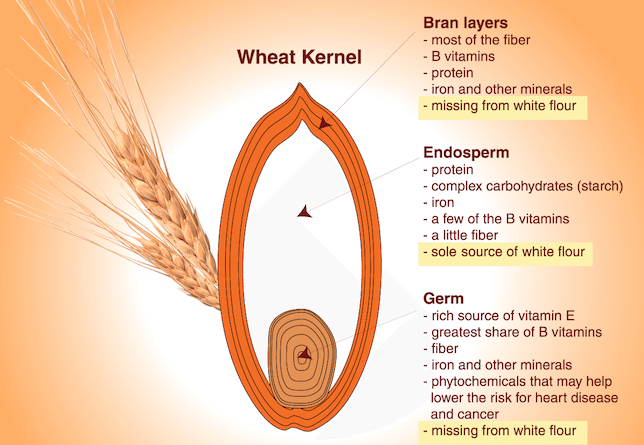More Whole Grains Equals Less Heart Disease
 MyPlate's current featured message is all about whole grains. Did you know that MyPlate recommends that people make at least half of all the grains they eat whole grains? To find out why, we consulted Dr. James J. Kenney...People who consume more whole grains have been shown to be less likely to develop insulin resistance, type 2 diabetes mellitus (DM), and cardiovascular disease (CVD). By contrast, people who consume more refined grains appear more likely to develop these diseases.Compared to refined grains, whole grains contain more of beneficial constituents such as magnesium, fiber, vitamin E, essential fatty acids, selenium, and numerous plant chemicals such plant sterols, phenols, and lignin. It is likely that the much greater amounts of these substances found largely in germ and bran layers of the grain account for whole grain's beneficial effects on several CVD risk factors.While the association between more whole grain intake and fewer CVD events has been widely replicated, there has been relatively little data on the impact of consuming more whole grains on the development and progression of atherosclerosis. One study of post-menopausal women with preexisting heart disease did show that those who consumed more whole grains were less likely to have their arteries grow more clogged with atherosclerotic plaques.1 More recently, researchers followed a more diverse group of 1178 middle-aged people (40-65 years old) over a 5-year period to determine if diet impacted the progression of atherosclerosis in their carotid arteries. The median daily intake of whole grains for the whole group was a mere 0.79 serving per day. Researchers found that those who consumed more than the median intake of whole grains experienced significantly less progression of their atherosclerotic plaques than those who averaged less than 0.79 servings of whole grains daily.2Bottom Line: Because of the growing and compelling research linking the consumption of whole grains with less type 2 DM and CVD current dietary guidelines call for Americans to consume 3 or more servings of whole grains daily. However, the average American continues to consume on average no more than 1 whole grain serving per day. Clearly health professionals, the food industry, and public health agencies need to work harder to increase the availability of whole grain products and encourage Americans to consume far more.By James J Kenney, PhD, RD, FACN1 Am Heart J 2005;105:94-1012 Am J Clin Nutr 2007;85:1495-502Want to learn more about grains? We've got tons of resources in the Nutrition Education Store!
MyPlate's current featured message is all about whole grains. Did you know that MyPlate recommends that people make at least half of all the grains they eat whole grains? To find out why, we consulted Dr. James J. Kenney...People who consume more whole grains have been shown to be less likely to develop insulin resistance, type 2 diabetes mellitus (DM), and cardiovascular disease (CVD). By contrast, people who consume more refined grains appear more likely to develop these diseases.Compared to refined grains, whole grains contain more of beneficial constituents such as magnesium, fiber, vitamin E, essential fatty acids, selenium, and numerous plant chemicals such plant sterols, phenols, and lignin. It is likely that the much greater amounts of these substances found largely in germ and bran layers of the grain account for whole grain's beneficial effects on several CVD risk factors.While the association between more whole grain intake and fewer CVD events has been widely replicated, there has been relatively little data on the impact of consuming more whole grains on the development and progression of atherosclerosis. One study of post-menopausal women with preexisting heart disease did show that those who consumed more whole grains were less likely to have their arteries grow more clogged with atherosclerotic plaques.1 More recently, researchers followed a more diverse group of 1178 middle-aged people (40-65 years old) over a 5-year period to determine if diet impacted the progression of atherosclerosis in their carotid arteries. The median daily intake of whole grains for the whole group was a mere 0.79 serving per day. Researchers found that those who consumed more than the median intake of whole grains experienced significantly less progression of their atherosclerotic plaques than those who averaged less than 0.79 servings of whole grains daily.2Bottom Line: Because of the growing and compelling research linking the consumption of whole grains with less type 2 DM and CVD current dietary guidelines call for Americans to consume 3 or more servings of whole grains daily. However, the average American continues to consume on average no more than 1 whole grain serving per day. Clearly health professionals, the food industry, and public health agencies need to work harder to increase the availability of whole grain products and encourage Americans to consume far more.By James J Kenney, PhD, RD, FACN1 Am Heart J 2005;105:94-1012 Am J Clin Nutr 2007;85:1495-502Want to learn more about grains? We've got tons of resources in the Nutrition Education Store!
